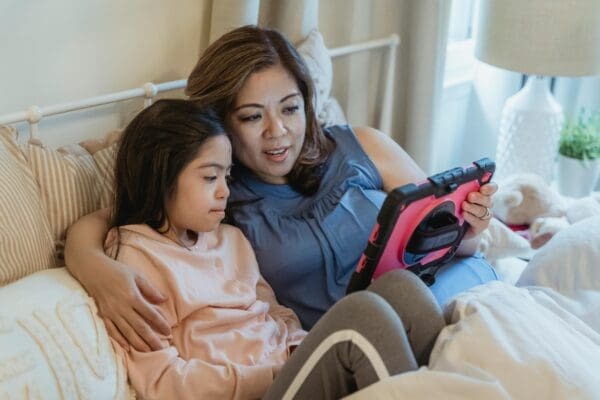Digital Parenting Advice to Help You Raise Tech-Savvy Kids
Want practical advice you can actually use? Start applying this digital parenting advice today and feel more confident guiding your kids in the online world.
The pervasive presence of technology in our lives means that kids are growing up in a world vastly different from the one their parents experienced. As a modern parent, it is essential to equip yourself with the right tools and strategies to guide your kids safely through the digital landscape. We’re diving into 10 must-know digital parenting advice strategies for navigating today’s connected world..
Not sure what being a Digital Parent means? Digital Parents and Raising Kids in a Tech World
Understanding the Digital Landscape
Before diving into specific digital parenting advice, it’s crucial to understand the digital landscape that children navigate every day. According to a 2021 survey by Common Sense Media, children aged 8 to 12 in the United States spend an average of nearly 5 hours per day on screens. This figure jumps to over 7 hours for teenagers. With such significant screen time, understanding the platforms and content they encounter is vital for effective digital parenting. This will only increase as tech and social media become more pervasive and an essential part of our daily digital routines.
1: Educate Yourself About Technology
To effectively guide your kids, you must first educate yourself about the technology and platforms they use. Familiarise yourself with popular social media apps (Snapchat, Instagram, TikTok), gaming platforms (Minecraft, Fortnite, GTA, Roblox, Halo) and communication tools (WhatsApp, Discord, WeChat, Snapchat). By understanding how these platforms work, you can better monitor your child’s activities and set appropriate boundaries. Ensuring kids do not use these platforms until they are fully aware of what to expect and at least know the dos and don’ts of these platforms.
2: Set Clear Rules and Boundaries
Establishing clear rules and boundaries regarding screen time and online behaviour is crucial. Create a family agreement that outlines acceptable and unacceptable online activities. For example, you might set a rule that devices are not allowed during family meals or after a certain time in the evening to ensure adequate sleep.

3: Encourage Open Communication
Encouraging open communication with your kids about their online experiences is essential. Let them know they can come to you with any concerns or questions about their digital interactions. Creating a safe space for discussions fosters trust and allows you to address potential issues early on.
Promoting Online Safety Practices
Ensuring your kids’ online safety is a top priority. With the rise of cyberbullying and online predators, parents must take proactive steps to protect their children.
4: Teach Online Privacy
Discuss the importance of online privacy with your kids. Teach them how to create strong, unique passwords and the significance of keeping personal information private. Encourage them to think critically about the information they share online and to be cautious about accepting friend requests from strangers.
5: Monitor Online Activities
Regularly monitor your kid’s online activities to ensure they are engaging in safe and appropriate behaviour. Utilise parental control tools and apps that allow you to track their digital footprint. However, balance monitoring with respect for their privacy to maintain trust.
6: Discuss Cyberbullying
Educate your kids about cyberbullying and its impact. Encourage them to speak up if they experience or witness cyberbullying. Discuss strategies for dealing with bullies, such as blocking them and reporting abusive behaviour to platform administrators.

Encouraging Healthy Digital Habits
While technology offers numerous benefits, it’s important to promote healthy digital habits to prevent over-reliance and negative effects on well-being.
7: Balance Screen Time
Help your kids find a balance between screen time and other activities. Encourage them to engage in physical activities, hobbies, and face-to-face interactions. Establish screen-free zones and times to promote a healthy balance.
8: Model Positive Behaviour
Kids often mimic their parents’ behaviour, so it’s essential to model positive digital habits. Be mindful of your screen time and demonstrate responsible technology use. Show them how to use technology as a tool for learning and creativity rather than just for entertainment.
9: Encourage Critical Thinking
Teach your kids to think critically about the content they consume online. Encourage them to question the credibility of sources and identify potential biases. By fostering critical thinking skills, you empower them to make informed decisions in the digital world.
Staying Informed and Adapting
The digital landscape is constantly evolving, so staying informed and adaptable is crucial for effective digital parenting.
10: Stay Updated on Trends
Stay informed about the latest digital trends and emerging technologies. Follow reputable sources, attend workshops, and participate in online parenting forums to keep up with the ever-changing digital world. This knowledge allows you to adapt your parenting strategies as necessary.
Parenting in the Digital Age
Parenting in the digital age presents unique challenges, but with the right strategies, you can guide your children toward safe and responsible technology use. By understanding the digital landscape, promoting safe online practices, encouraging healthy digital habits, and staying informed, you can empower your children to navigate the digital world confidently.
Implementing these 10 essential pieces of digital parenting advice will help you become a more effective and supportive modern parent, able to set boundaries and talk openly about the digital world.
I go into a lot more detail on Digital Parenting Advice in my new ebook, which is published on Amazon; click the following link to purchase: Digital Parenting: Children’s Online Safety – Tips and Strategies for Parents.
Disclaimer
The views and opinions expressed in this blog are solely my own and reflect my personal experiences as a digital parent to two teenage, online game-playing boys. While I strive to provide helpful information and share what has worked for me, please remember that everyone’s situation is unique. The content provided here is not intended as professional advice. If you require specific guidance or support, I strongly encourage you to seek assistance from qualified professionals in the relevant field
